By Leen Randell
Updated: Jul 04, 2024
10 Best Herbal Decoctions For Ulcerative Colitis
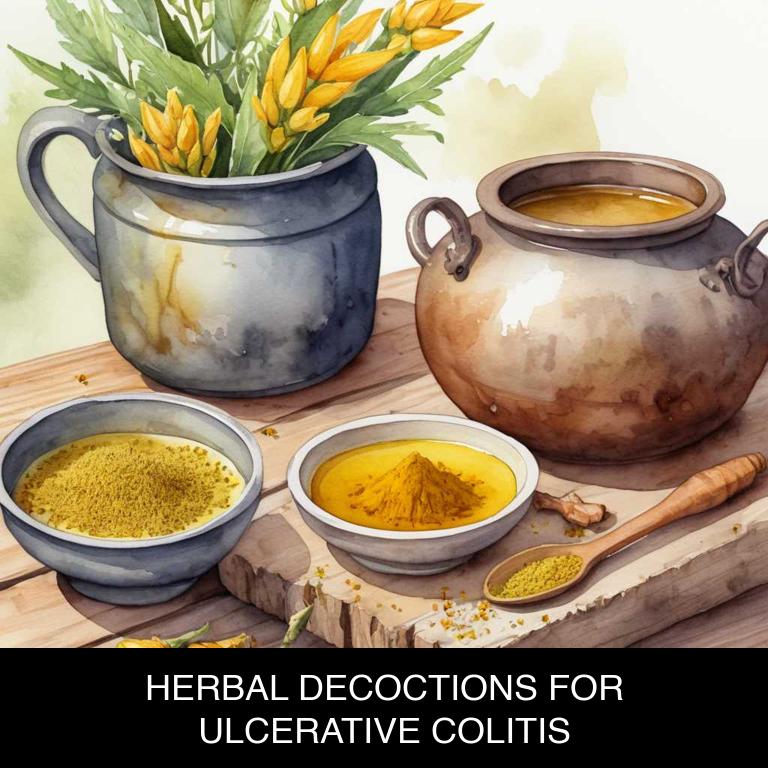
Herbal decoctions for ulcerative colitis are a natural remedy made by steeping herbs in hot water, which can provide relief from symptoms such as abdominal pain, diarrhea, and weight loss.
These herbal decoctions work by reducing inflammation and healing the gut lining, thus improving digestion and overall well-being. Examples of helpful herbal decoctions include licorice root tea, which soothes digestive issues, and turmeric tea, which has anti-inflammatory properties.
By incorporating these decoctions into their daily routine, individuals with ulcerative colitis can experience improved digestion, reduced symptoms, and a significant enhancement in their quality of life.
The following article describes in detail the most important decoctions for ulcerative colitis, including medicinal properties, parts of herbs to use, and recipes for preparations.
- 1. Curcuma longa
- 2. Zingiber officinale
- 3. Althaea officinalis
- 4. Ulmus rubra
- 5. Glycyrrhiza glabra
- 6. Taraxacum officinale
- 7. Carthamus tinctorius
- 8. Matricaria chamomilla
- 9. Mentha x piperita
- 10. Foeniculum vulgare
- What is the best combination of herbal decoctions to use for ulcerative colitis?
- What ailments similar to ulcerative colitis are treated with herbal decoctions?
1. Curcuma longa
Turmeric decoctions helps with ulcerative colitis because they contain curcumin, a potent anti-inflammatory compound that reduces inflammation in the colon.
Curcumin has been shown to inhibit the production of pro-inflammatory enzymes and chemicals, thereby alleviating symptoms such as diarrhea, abdominal pain, and cramping. Additionally, turmeric's antioxidant properties help to repair damaged gut lining and promote healing, reducing the risk of further inflammation and damage.
Regular consumption of turmeric decoctions may help to manage disease activity and improve quality of life for individuals with ulcerative colitis.
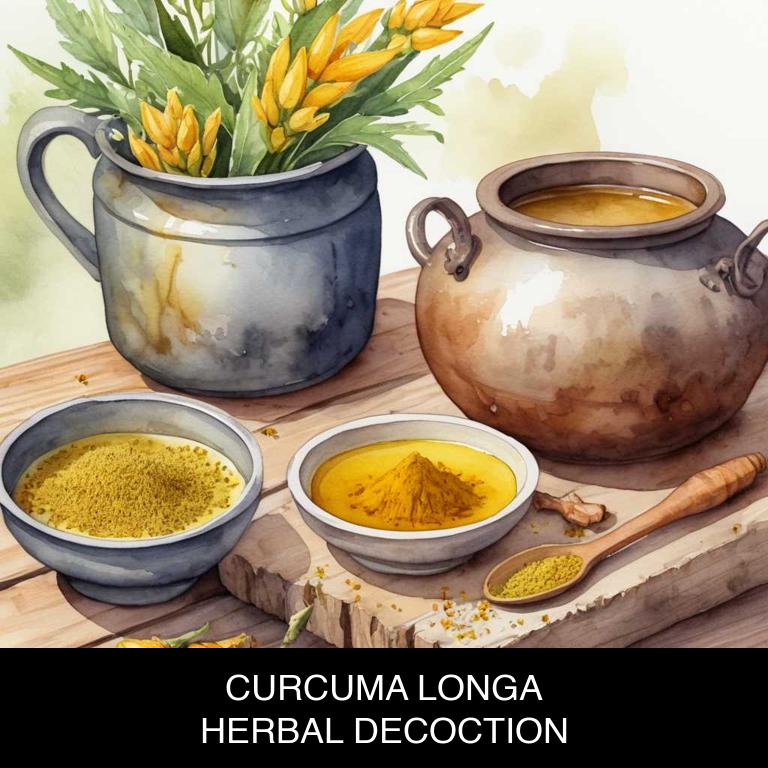
Medicinal Constituents
The list below shows the primary medicinal constituents in Curcuma longa decoctions that help with ulcerative colitis.
- Curcumin: Curcumin, a polyphenolic compound, helps with ulcerative colitis by reducing inflammation and oxidative stress through its potent antioxidant and anti-inflammatory properties.
- Demethoxycurcumin: DMC, a bioactive curcuminoid, helps with ulcerative colitis by inhibiting the production of pro-inflammatory cytokines and enzymes, thereby reducing inflammation and promoting healing.
- Bisdemethoxycurcumin: BDMC, another curcuminoid, helps with ulcerative colitis by inducing apoptosis (cell death) in inflamed cells, reducing inflammation and preventing the progression of the disease.
Parts Used
The list below shows the primary parts of turmeric used to make decoctions for ulcerative colitis.
- Roots: The roots of Curcuma longa contain a high amount of curcumin and other bioactive compounds that help to reduce inflammation and alleviate symptoms associated with ulcerative colitis.
- Stems: The stems of Curcuma longa contain a significant amount of curcumin and other compounds that have anti-inflammatory and antioxidant properties, which can help to soothe and heal the digestive tract in ulcerative colitis patients.
Quick Recipe
The following recipe gives a procedure to make a basic turmeric for ulcerative colitis.
- Select high-quality curcuma longa rhizomes and clean them thoroughly to remove any dirt or debris.
- Grind 1-2 teaspoons of the cleaned rhizomes into a fine powder using a mortar and pestle for 2 minutes.
- Combine 1 teaspoon of the powder with 1 cup of boiling water in a heat-resistant cup or teapot.
- Allow the mixture to steep for 10-15 minutes to enable the bioactive compounds to infuse into the water.
- Strain the liquid through a fine-mesh sieve into a separate container and discard the solids.
2. Zingiber officinale
Ginger decoctions helps with ulcerative colitis because it has anti-inflammatory properties that help reduce inflammation in the colon, which is a hallmark symptom of the disease.
The decoction's bioactive compounds, such as gingerols and shogaols, have been shown to inhibit the production of pro-inflammatory cytokines, thereby mitigating the immune system's overactive response.
Additionally, ginger has antioxidant properties that help protect the colon from oxidative stress, further reducing inflammation and promoting healing in individuals with ulcerative colitis.
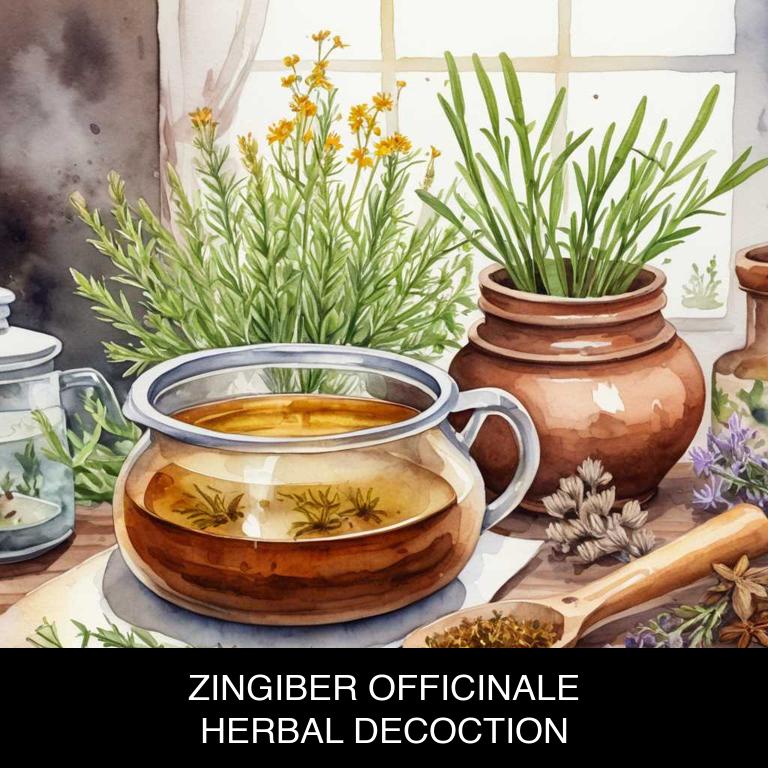
Medicinal Constituents
The list below shows the primary medicinal constituents in Zingiber officinale decoctions that help with ulcerative colitis.
- Gingerols: Gingerols, particularly 6-gingerol and 8-gingerol, have anti-inflammatory properties that help reduce inflammation in the colon, alleviating symptoms of ulcerative colitis.
- Shogaols: Shogaols, a type of phenolic compound, have antioxidant and anti-inflammatory effects that help protect the colon from oxidative stress and inflammation, contributing to the management of ulcerative colitis.
- Zingerone: Zingerone, a ginger-derived phenolic compound, has potent anti-inflammatory and antioxidant properties that help reduce inflammation and oxidative stress in the colon, which can aid in the treatment of ulcerative colitis.
Parts Used
The list below shows the primary parts of ginger used to make decoctions for ulcerative colitis.
- Rhyzomes: The most commonly used part for decoctions due to its high concentration of bioactive compounds that have anti-inflammatory and antioxidant properties.
- Roots: The root of Zingiber officinale is also used for its anti-inflammatory and antioxidant properties, which help in reducing inflammation and promoting healing in ulcerative colitis.
- Buds: The buds of Zingiber officinale are used for their antimicrobial and anti-inflammatory properties, which help in reducing the severity of symptoms in ulcerative colitis.
Quick Recipe
The following recipe gives a procedure to make a basic ginger for ulcerative colitis.
- Harvest 5-10 grams of fresh zingiber officinale roots with a smooth knife or a garden tool.
- Clean the roots thoroughly with water to remove any dirt or debris for 5 minutes.
- Cut the roots into small pieces and boil them in 250 milliliters of water for 5-7 minutes.
- Strain the decoction through a cheesecloth or a fine-mesh sieve to remove the root particles for 2 minutes.
- Store the decoction in the refrigerator for up to 24 hours or consume immediately.
3. Althaea officinalis
Marshmallow decoctions helps with ulcerative colitis because they provide a soothing and protective coating for the mucous membranes in the digestive tract.
The gel-like substance derived from the marshmallow root helps to shield inflamed areas, reducing irritation and discomfort. Additionally, the anti-inflammatory properties of marshmallows may help to calm inflammation and reduce oxidative stress, promoting healing and reducing symptoms such as diarrhea, abdominal pain, and rectal bleeding.
This natural remedy can offer relief and improve quality of life for individuals suffering from ulcerative colitis.
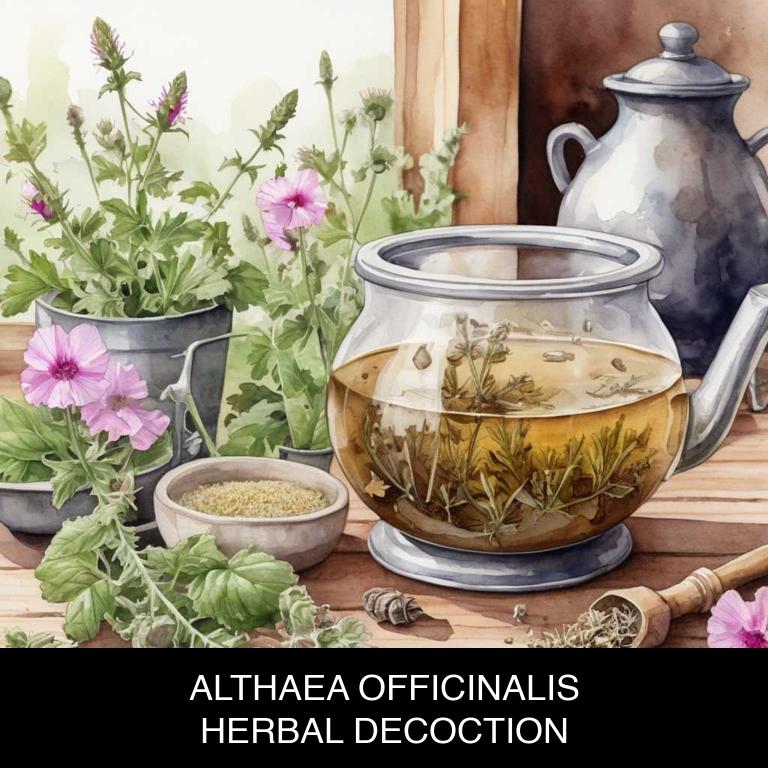
Medicinal Constituents
The list below shows the primary medicinal constituents in Althaea officinalis decoctions that help with ulcerative colitis.
- Mucilages: Mucilages help with ulcerative colitis by forming a protective barrier on the gut mucosa, reducing inflammation and irritation.
- Altheanin: Altheanin exhibits anti-inflammatory properties, which help alleviate the symptoms of ulcerative colitis by reducing the production of pro-inflammatory cytokines.
- Polysaccharides: Polysaccharides help with ulcerative colitis by stimulating the growth of beneficial gut bacteria, promoting a balanced gut microbiome and reducing inflammation.
Parts Used
The list below shows the primary parts of marshmallow used to make decoctions for ulcerative colitis.
- Roots: They are the primary source of mucilage, a key component in treating ulcerative colitis due to its soothing and protective properties.
- Leaves: They are also rich in mucilage and other beneficial compounds, making them a secondary source for treating ulcerative colitis.
- Stems: Although not as commonly used as roots and leaves, stems of Althaea officinalis are still used in some decoctions due to their mucilaginous properties and potential anti-inflammatory effects.
Quick Recipe
The following recipe gives a procedure to make a basic marshmallow for ulcerative colitis.
- Harvest 1-2 cups of fresh althaea officinalis roots or 2-3 tablespoons of dried root powder for the decoction.
- Clean the althaea officinalis root material thoroughly to remove any dirt or debris with cold water.
- Combine the althaea officinalis root material with 4 cups of water in a saucepan and bring to a boil.
- Reduce the heat to a simmer and let the decoction steep for 10-15 minutes to release the active compounds.
- Strain the decoction and discard the solids before serving the liquid as a medicinal tea.
4. Ulmus rubra
Slippery elm decoctions helps with ulcerative colitis because it soothes and protects the mucous membranes in the digestive tract, reducing inflammation and irritation.
The mucilage extracted from the inner bark of the slippery elm tree forms a protective barrier that shields the gut lining from further damage, promoting healing and repair.
This natural anti-inflammatory action can help to alleviate symptoms such as abdominal pain, diarrhea, and rectal bleeding often associated with ulcerative colitis.
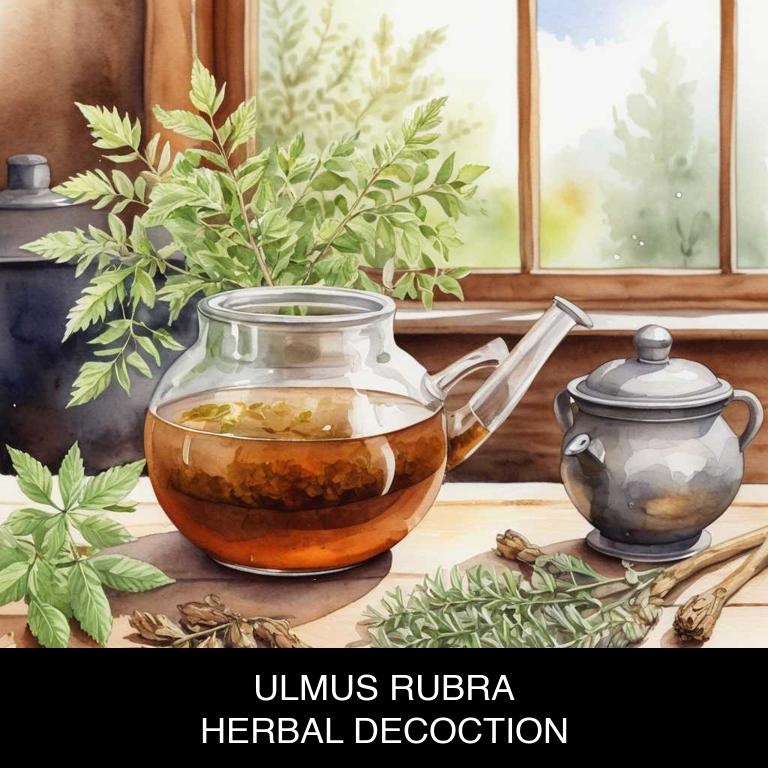
Medicinal Constituents
The list below shows the primary medicinal constituents in Ulmus rubra decoctions that help with ulcerative colitis.
- Triterpenes: These compounds have anti-inflammatory properties, which can help reduce inflammation in the colon and alleviate symptoms of ulcerative colitis.
- Phenolic acids: These compounds have antioxidant and anti-inflammatory properties, which can help protect the colon from oxidative stress and inflammation, and may help reduce the severity of ulcerative colitis symptoms.
- Flavonoids: These compounds have anti-inflammatory and antioxidant properties, which can help reduce inflammation and oxidative stress in the colon, and may help protect against the progression of ulcerative colitis.
Parts Used
The list below shows the primary parts of slippery elm used to make decoctions for ulcerative colitis.
- Roots: Used due to their potential anti-inflammatory properties.
- Barks: Used due to their potential ability to soothe and calm the digestive system.
- Leaves: Used due to their potential antioxidant properties that may help reduce inflammation in the digestive tract.
Quick Recipe
The following recipe gives a procedure to make a basic slippery elm for ulcerative colitis.
- Harvest 1 part of the roots and 2 parts of the bark of ulmus rubra in late summer or early fall.
- Chop 1/2 cup of the harvested material into small pieces and place it in a saucepan.
- Combine 2 cups of water with the chopped material in the saucepan and bring to a boil.
- Reduce heat to a simmer and let the decoction steep for 10-15 minutes or until the liquid has reduced slightly.
- Strain the decoction through a cheesecloth or a fine-mesh sieve into a clean container and discard the solids.
5. Glycyrrhiza glabra
Licorice decoctions helps with ulcerative colitis because of its anti-inflammatory properties, which soothe and calm irritated gut lining.
The flavonoids and isoflavones present in licorice root have been shown to reduce inflammation in the colon, thereby alleviating symptoms such as abdominal pain, diarrhea, and rectal bleeding. Additionally, licorice decoctions may help repair damaged gut lining by increasing the production of mucin, a protective barrier that shields the intestines from further damage.
This natural remedy has been traditionally used to promote digestive health and provide relief for individuals with ulcerative colitis.

Medicinal Constituents
The list below shows the primary medicinal constituents in Glycyrrhiza glabra decoctions that help with ulcerative colitis.
- Licorice flavonoids: Licorice flavonoids, specifically glabridin and glabrene, help with ulcerative colitis by reducing inflammation and preventing the breakdown of the intestinal lining, thereby alleviating symptoms.
- Glycyrrhizin: Glycyrrhizin, a triterpenoid saponin, helps with ulcerative colitis by exerting anti-inflammatory effects, reducing oxidative stress, and protecting the intestinal epithelial barrier function.
- Isoliquiritigenin: Isoliquiritigenin, a flavonoid, helps with ulcerative colitis by suppressing the production of pro-inflammatory cytokines, reducing inflammation and oxidative stress, and promoting the healing of the intestinal mucosa.
Parts Used
The list below shows the primary parts of licorice used to make decoctions for ulcerative colitis.
- Roots: They are the primary source of glycyrrhizin, a triterpenoid saponin responsible for the anti-inflammatory and immunomodulatory effects that help alleviate ulcerative colitis symptoms.
- Barks: The barks are also rich in glycyrrhizin and other bioactive compounds that contribute to their anti-inflammatory and soothing properties, making them an effective remedy for ulcerative colitis.
- Leaves: While less studied than the roots and barks, the leaves of Glycyrrhiza glabra are still used in traditional medicine due to their potential anti-inflammatory and antioxidant effects that may help manage ulcerative colitis symptoms.
Quick Recipe
The following recipe gives a procedure to make a basic licorice for ulcerative colitis.
- Harvest 20-30 grams of dried glycyrrhiza glabra roots in the late summer or early fall season.
- Crush the dried roots into a fine powder using a mortar and pestle or spice grinder for 5 minutes.
- Combine 2-3 teaspoons of the powdered root with 1 quart of boiling water in a heat-resistant glass container.
- Allow the mixture to steep for 10-15 minutes to release the active compounds and flavors into the water.
- Strain the decoction through a cheesecloth or a fine-mesh sieve into a clean glass container and discard the solids.
6. Taraxacum officinale
Dandelion decoctions helps with ulcerative colitis because they contain potent anti-inflammatory compounds that reduce inflammation and alleviate symptoms.
The decoction's high concentration of antioxidants and flavonoids neutralizes free radicals, protecting the colon lining from damage and promoting healing. Additionally, dandelion's prebiotic properties foster a healthy gut microbiome, which is essential for maintaining a balanced digestive system and alleviating UC symptoms such as diarrhea, abdominal pain, and bloating.
By addressing underlying inflammation and promoting gut health, dandelion decoctions provide a natural and effective remedy for ulcerative colitis sufferers.

Medicinal Constituents
The list below shows the primary medicinal constituents in Taraxacum officinale decoctions that help with ulcerative colitis.
- Inulin: Inulin helps with ulcerative colitis by promoting the growth of beneficial gut bacteria, thereby improving gut health and reducing inflammation.
- Saponins: Saponins help with ulcerative colitis by exerting anti-inflammatory and antioxidant effects, which can reduce the severity of symptoms and promote healing in the gut.
- Phenolic acids: Phenolic acids help with ulcerative colitis by exhibiting anti-inflammatory and antioxidant properties, which can reduce inflammation and oxidative stress in the gut, thereby alleviating symptoms.
Parts Used
The list below shows the primary parts of dandelion used to make decoctions for ulcerative colitis.
- Leaves: The leaves are the most commonly used part of Taraxacum officinale to make decoctions for ulcerative colitis, as they contain bioactive compounds that have anti-inflammatory properties.
- Roots: The roots are used to make decoctions for ulcerative colitis due to their high content of saponins, which have been shown to have anti-inflammatory and antioxidant effects.
- Seeds: The seeds are also used to make decoctions for ulcerative colitis, as they contain fatty acids and other compounds that may help reduce inflammation in the colon.
Quick Recipe
The following recipe gives a procedure to make a basic dandelion for ulcerative colitis.
- Gather 1-2 handfuls of dried taraxacum officinale leaves and flowers for decoction preparation.
- Combine the collected taraxacum officinale with 2 cups of water in a saucepan.
- Bring the taraxacum officinale mixture to a boil over high heat for 10-15 minutes.
- Reduce the heat to low and let the taraxacum officinale decoction simmer for 30 minutes.
- Strain the taraxacum officinale decoction through a cheesecloth or a fine-mesh sieve into a cup.
7. Carthamus tinctorius
Safflower decoctions helps with ulcerative colitis because it possesses potent anti-inflammatory properties that soothe and calm inflamed digestive tissues.
The decoction's flavonoids and phenolic acids help to reduce inflammation and oxidative stress, which are hallmark characteristics of the disease. Additionally, safflower's antioxidant activity helps to protect against damage caused by free radicals, promoting a healthy gut environment and reducing symptoms such as abdominal pain, diarrhea, and bloating associated with ulcerative colitis.
This natural remedy has been shown to provide relief and improve quality of life for individuals suffering from this chronic condition.
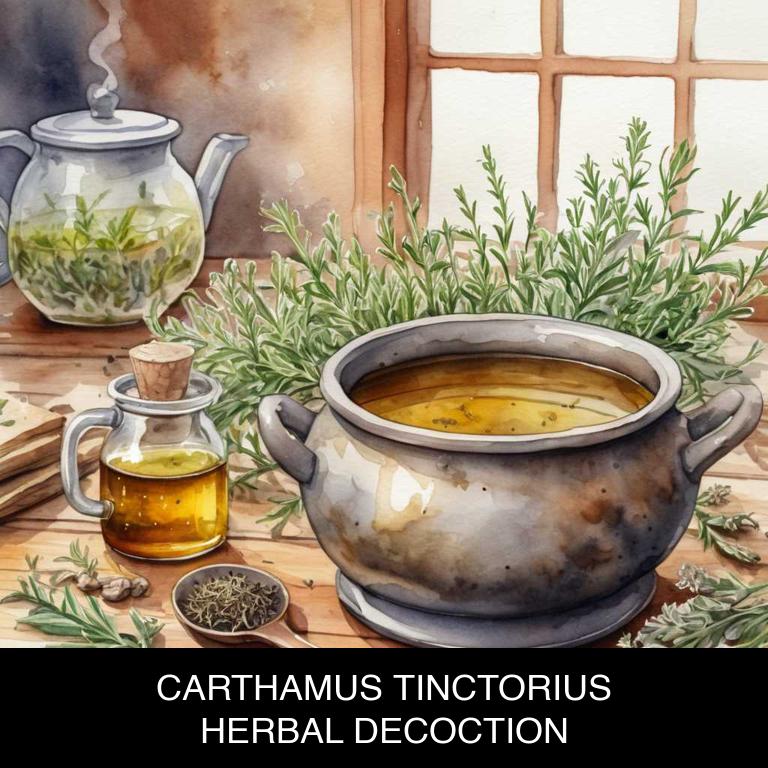
Medicinal Constituents
The list below shows the primary medicinal constituents in Carthamus tinctorius decoctions that help with ulcerative colitis.
- Saponins: These triterpenoid glycosides have anti-inflammatory properties that help reduce the inflammation associated with ulcerative colitis, thereby alleviating symptoms and promoting healing in the gut.
- Phenolic acids: These compounds exhibit antioxidant and anti-inflammatory activities, which help protect the gut from oxidative stress and inflammation, and may also inhibit the growth of pathogenic bacteria that contribute to ulcerative colitis.
- Flavonoids: Specifically, flavonoids like quercetin and kaempferol have been shown to have anti-inflammatory and antioxidant properties, which may help reduce the severity of ulcerative colitis symptoms, such as diarrhea and abdominal pain, and promote the healing of the gut mucosa.
Parts Used
The list below shows the primary parts of safflower used to make decoctions for ulcerative colitis.
- Roots: Roots are used due to their anti-inflammatory properties, which can help alleviate symptoms of ulcerative colitis.
- Seeds: Seeds are used due to their antioxidant and anti-inflammatory properties, which can help reduce inflammation and improve symptoms of ulcerative colitis.
- Flowers: Flowers are used due to their anti-inflammatory and antimicrobial properties, which can help reduce inflammation and prevent infections that can exacerbate ulcerative colitis.
Quick Recipe
The following recipe gives a procedure to make a basic safflower for ulcerative colitis.
- Harvest 30-60 grams of dried flowers of carthamus tinctorius from a reliable source.
- Chop the carthamus tinctorius flowers into smaller pieces to increase their surface area.
- Steep 5-10 grams of chopped flowers in 200-500 milliliters of boiling water for 5-10 minutes.
- Strain the liquid decoction from the plant material through a cheesecloth or fine mesh.
- Store the prepared decoction in a clean glass container in the refrigerator for up to 24 hours.
8. Matricaria chamomilla
Chamomile decoctions helps with ulcerative colitis because of its anti-inflammatory properties, which soothe and calm the digestive tract.
The apigenin in chamomile binds to receptors in the gut, reducing inflammation and pain associated with ulcerative colitis. Additionally, chamomile's antimicrobial effects help eliminate harmful bacteria that can exacerbate symptoms.
By reducing inflammation and promoting a healthy balance of gut flora, chamomile decoctions may help alleviate symptoms such as abdominal pain, diarrhea, and frequent bowel movements characteristic of the condition.
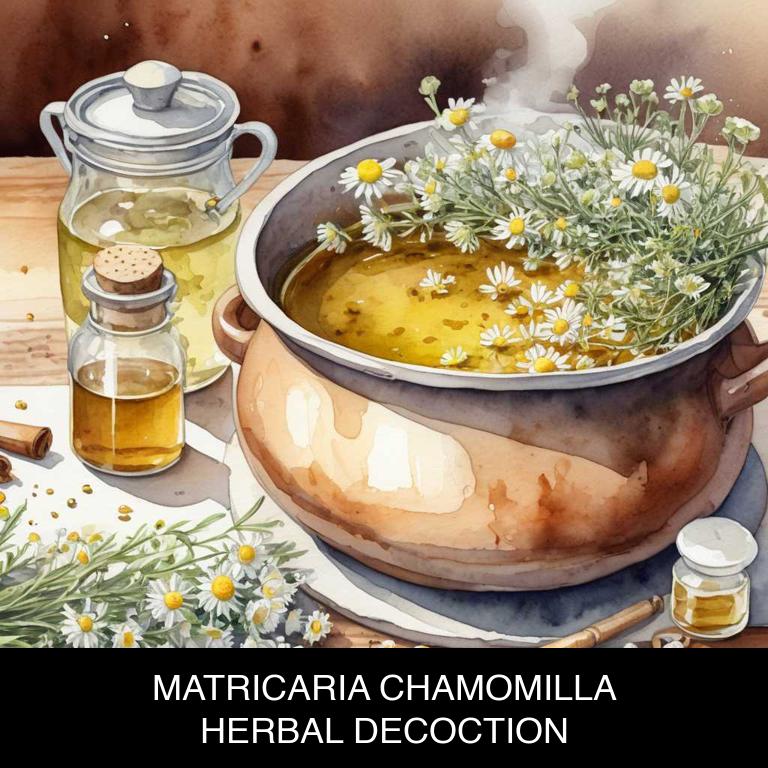
Medicinal Constituents
The list below shows the primary medicinal constituents in Matricaria chamomilla decoctions that help with ulcerative colitis.
- Apigenin: Apigenin, a flavonoid, helps reduce inflammation in the gut and alleviate symptoms of ulcerative colitis by inhibiting the production of pro-inflammatory cytokines.
- Luteolin: Luteolin, a flavonoid, exerts anti-inflammatory effects by reducing the production of pro-inflammatory enzymes and cytokines, which contribute to the progression of ulcerative colitis.
- Α-bisabolol: α-Bisabolol, a sesquiterpene, has anti-inflammatory and antioxidant properties, which help protect the gut lining from damage and reduce the severity of ulcerative colitis symptoms.
Parts Used
The list below shows the primary parts of chamomile used to make decoctions for ulcerative colitis.
- Flowers: They are rich in apigenin and luteolin, flavonoids with anti-inflammatory properties that help alleviate symptoms of ulcerative colitis.
- Leaves: The leaves contain flavonoids and terpenoids that have anti-inflammatory and antioxidant effects, which can help reduce inflammation and improve symptoms of ulcerative colitis.
- Seeds: The seeds of Matricaria chamomilla contain flavonoids and other bioactive compounds that have anti-inflammatory and antioxidant effects, which can help soothe the digestive tract and alleviate symptoms of ulcerative colitis.
Quick Recipe
The following recipe gives a procedure to make a basic chamomile for ulcerative colitis.
- Gather 2 tablespoons of dried matricaria chamomilla flowers and 1 quart of boiling water.
- Steep the flowers in the boiling water for 5 to 7 minutes.
- Strain the mixture through a cheesecloth into a clean container.
- Discard the solids and store the decoction in the refrigerator for up to 24 hours.
- Use 1 to 2 ounces of the decoction as needed.
9. Mentha x piperita
Peppermint decoctions helps with ulcerative colitis because its active compound, menthol, has anti-inflammatory properties that soothe and relax the gut lining, reducing inflammation and spasms in the colon.
The decoction also helps to reduce symptoms such as abdominal pain, bloating, and diarrhea by relaxing the muscles in the digestive tract and improving digestion.
Additionally, peppermint's antimicrobial properties help to combat unwanted bacteria in the gut, further contributing to a reduction in ulcerative colitis symptoms.
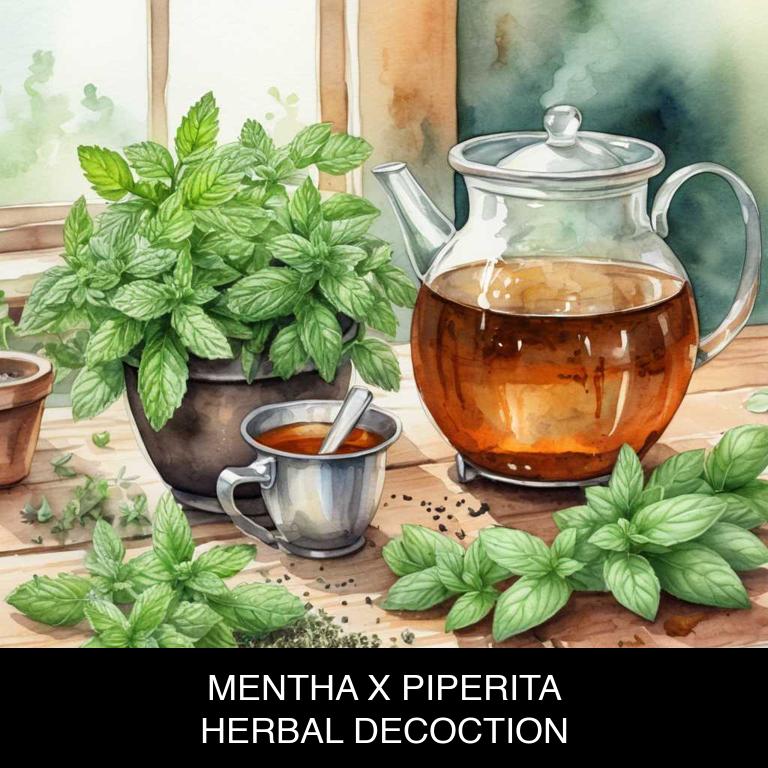
Medicinal Constituents
The list below shows the primary medicinal constituents in Mentha x piperita decoctions that help with ulcerative colitis.
- Rosmarinic acid: It has anti-inflammatory properties, which help reduce inflammation and oxidative stress in the colon, contributing to the management of ulcerative colitis symptoms.
- Limonene: It has been shown to have anti-inflammatory and antioxidant effects, which may help alleviate the symptoms of ulcerative colitis by reducing inflammation and promoting healing in the gut.
- Menthol: It has anti-inflammatory and antimicrobial properties, which may help soothe the gut lining, reduce inflammation, and prevent infections that can exacerbate ulcerative colitis.
Parts Used
The list below shows the primary parts of peppermint used to make decoctions for ulcerative colitis.
- Leaves: High in antioxidants and flavonoids, which help reduce inflammation and alleviate symptoms.
- Stems: Contain menthol, which has anti-inflammatory and soothing properties, helping to calm the digestive tract.
- Roots: Rich in compounds like menthone and limonene, which have anti-inflammatory and antimicrobial effects, aiding in the healing of the gut lining.
Quick Recipe
The following recipe gives a procedure to make a basic peppermint for ulcerative colitis.
- Measure 1 cup of fresh leaves or 1/2 cup of dried leaves of mentha x piperita.
- Crush the leaves into smaller pieces to release their essential oils and flavors slowly over time.
- Combine the crushed leaves with 2 cups of water in a saucepan and bring to a boil.
- Reduce heat to a simmer for 5-10 minutes allowing the decoction to infuse and cool.
- Strain the mixture through a cheesecloth or fine-mesh sieve into a cup or container.
10. Foeniculum vulgare
Fennel decoctions helps with ulcerative colitis because it has anti-inflammatory and antioxidant properties that soothe and heal the digestive tract.
The decoction's carminative action helps to reduce bloating, cramps, and flatulence, alleviating symptoms such as abdominal pain and diarrhea. Additionally, fennel's ability to stimulate digestion and improve gut motility can help to reduce inflammation and promote healing in the colon.
This natural remedy can provide relief from the discomfort and distress associated with ulcerative colitis, promoting a healthier digestive system.
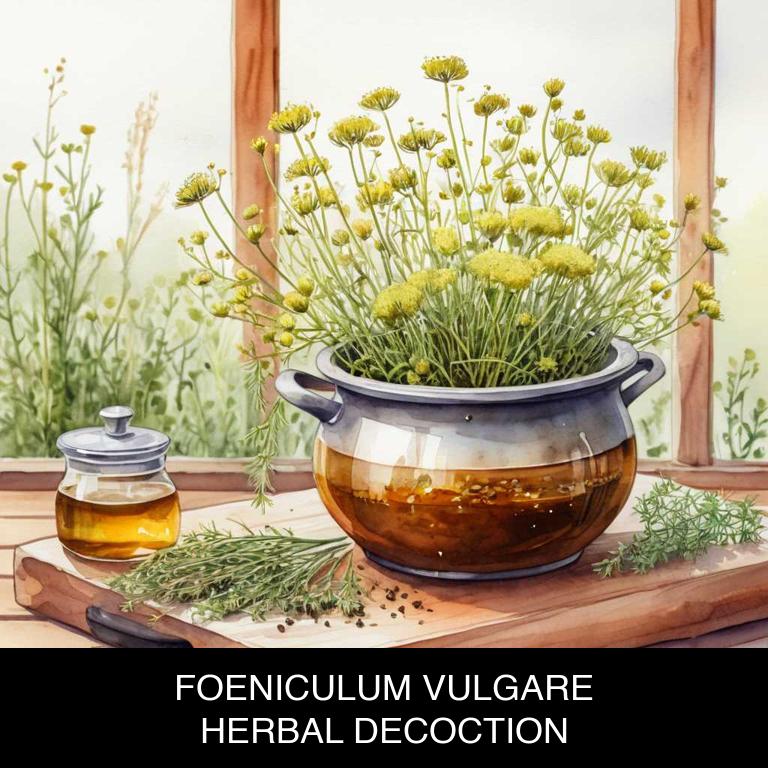
Medicinal Constituents
The list below shows the primary medicinal constituents in Foeniculum vulgare decoctions that help with ulcerative colitis.
- Fenchone: A terpene that has anti-inflammatory properties, which can help reduce inflammation in the colon and alleviate symptoms of ulcerative colitis.
- Anethole: An organic compound with phenolic properties, which can act as an antioxidant and anti-inflammatory agent, reducing oxidative stress and inflammation in the colon.
- Phenolic acids: Compounds with antioxidant and anti-inflammatory properties, which can help protect the colon from oxidative damage, reduce inflammation, and promote healing of the intestinal mucosa.
Parts Used
The list below shows the primary parts of fennel used to make decoctions for ulcerative colitis.
- Seeds: Foeniculum vulgare seeds are commonly used due to their high content of essential oils, particularly anethole, which has anti-inflammatory and soothing properties.
- Roots: Foeniculum vulgare roots are often used because they contain a high concentration of sesquiterpene lactones, which have anti-inflammatory and immunomodulatory effects.
- Leaves: Foeniculum vulgare leaves are frequently used due to their rich content of flavonoids and phenolic acids, which exhibit antioxidant and anti-inflammatory activities.
Quick Recipe
The following recipe gives a procedure to make a basic fennel for ulcerative colitis.
- Harvest 20 to 30 grams of foeniculum vulgare roots and cut them into small pieces for decoction preparation.
- Combine the cut roots with 1 liter of water in a saucepan and bring to a boil over high heat.
- Reduce the heat to medium and simmer the mixture for 10 to 15 minutes to facilitate extraction.
- Strain the decoction through a cheesecloth or a fine-mesh sieve into a clean container to remove solids.
- Allow the decoction to cool and store it in a sealed container in the refrigerator for up to 24 hours.
What is the best combination of herbal decoctions to use for ulcerative colitis?
The best combination of herbal decoctions that help with ulcerative colitis is Turmeric and Ginger decoction, Slippery Elm decoction, and Licorice Root decoction.
Turmeric's anti-inflammatory properties and Ginger's warming effect help reduce inflammation and ease digestive discomfort. Slippery Elm soothes the mucous membranes in the colon, while Licorice Root provides anti-inflammatory and antioxidant benefits.
A balanced blend of these decoctions may help alleviate symptoms, promote healing, and support overall gut health in individuals with ulcerative colitis.
What ailments similar to ulcerative colitis are treated with herbal decoctions?
Ailments similar to ulcerative colitis that are treated with herbal decoctions are inflammatory bowel diseases such as Crohn's disease and irritable bowel syndrome (IBS).
Decoctions made from herbs like Slippery Elm, Marshmallow root, and Licorice root have anti-inflammatory properties that help soothe the digestive tract and reduce inflammation.
Additionally, herbal decoctions containing Turmeric, Ginger, and Fennel seeds may also alleviate symptoms of IBS such as abdominal pain, bloating, and diarrhea.